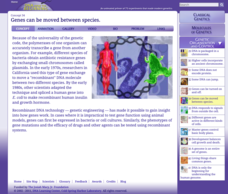Judicial Learning Center
Why Study Landmark Cases?
Why study landmark Supreme court cases? A helpful lesson offers a brief but valuable argument for the importance of these cases in the field of criminology. It introduces scholars to some key terms necessary for studying court cases and...
Physics Classroom
Waves - Case Studies
What can your class tell about a wave just by looking at it? Using a simulation, physics pupils work through a series of case studies to determine the effects of speed, frequency, and density on waves. Part of a larger playlist on waves...
DocsTeach
Environmental Case Study: Hetch Hetchy Valley
What is more important: building a new school or preserving a nature reserve? Keeping a natural area clean or providing clean drinking water to a city of millions? Young scholars weigh these questions—almost literally—using an...
DocsTeach
School Desegregation Court Cases: Mendez v. Westminster and Brown v. Board
Separate is not equal! Young historians analyze the petition from the U.S. Supreme Court case Mendez v. Westminster filed in 1945 and examine background material about the case. They then compare it to the more famous Brown v. Board of...
DocsTeach
U.S. v. Amistad: A Case of Jurisdiction
Just what is jurisdiction and why does it matter? A helpful activity takes academics on a journey to understand how judicial jurisdiction works. Scholars read excerpts from the Constitution and court documents to understand the process...
Howard Hughes Medical Institute
How Animals Use Sound to Communicate
Communication involves the visual, auditory, olfactory, and tactile senses. Scholars observe groups of animals communicating through multiple senses. They note and learn why different species use different senses depending on their...
Judicial Learning Center
Your 4th Amendment Rights
Americans love to learn about their rights, especially those that protect them from the government's power to invade their privacy. Young people are especially engaged by this topic. An informative lesson explores four Supreme Court...
Judicial Learning Center
Your 1st Amendment Rights
Why should classes care about the First Amendment? An engaging lesson serves as a powerful tool for answering just that. As all four cases in the lesson relate directly to freedom of expression in schools, young scholars explore the...
Judicial Learning Center
Civil Rights and Equal Protection
Almost every American is familiar with the Supreme Court case of Brown vs. Board of Education. Far fewer understand the constitutional reasoning or the wide-ranging consequences of the ruling in the field of criminology. The interesting...
Curated OER
Leonardo da Vinci
Are you studying Leonardo da Vinci in your class? This resource is made up of 3 study questions and 7 essay topics about Leonardo da Vinci that you could use to test your learners' biographical knowledge. Class members may check some of...
Judicial Learning Center
State Courts vs. Federal Courts
Popular culture often portrays the Feds as the most fearsome of law enforcement agencies. Yet, someone charged with a crime is considerably more likely to end up in a state court. The lesson, one of six covering the Organization of the...
DocsTeach
Alfred Sinker and the Writ of Habeas Corpus in 1861
Scholars learn how the judicial system treated under-age Civil War soldiers using historical analysis. The resource uses court documents to help historians understand why Habeas Corpus was used in the case of Alfred Sinker and why he was...
iCivics
Supreme Decision
Is the right to wear a band t-shirt included in our freedom of speech? Budding historians consider the question by using a video game. After a brief animated video, users drop in and listen to Supreme Court justices as they debate the...
Judicial Learning Center
Getting Ready for Trial
A courtroom can be a scary place for the uninitiated. Get familiar with the process using a helpful overview of the activities that take place prior to both civil and criminal cases. The lesson explains the differences between civil and...
US National Archives
Eastern Europe 1939-45 — Stalingrad
Acts of civilian courage in Great Britain—and in one case, the island of Malta—often receive the George Cross, instituted by King George VI at the beginning of World War II. After the valiant defense of Stalingrad by its inhabitants,...
Judicial Learning Center
Judicial Independence
Most people support the idea of an independent judiciary in theory until they hear about a court case that violates their principles. An informative resource explains why the concept is important. It also provides scholars of criminology...
National Constitution Center
Abraham Lincoln's Crossroads
History enthusiasts participate in an interactive website that brings Abraham Lincoln to life as he shares his personal experiences between 1854-1864. Scholars listen and read carefully to form their own opinions and discover if they...
Howard Hughes Medical Institute
Central Dogma and Genetic Medicine
Scientists work every day to find solutions to genetic diseases. Scholars learn about the process of gene sequencing, mutations, and the results. They explore genetic diseases and therapies to intervene and help and, through case...
Curated OER
One Word Substitution 42
In this online interactive vocabulary skills activity, students match the 10 vocabulary terms in the word bank to the appropriate definitions. Students may submit their answers to be scored.
Judicial Learning Center
Your Day in Court
Whether out of choice or necessity, people want to know what will happen on a typical day in court. A helpful lesson walks scholars in the field of criminology through the trial process from opening statements to the final verdict.
Judicial Learning Center
The Players in the Courtroom
Courtrooms are complicated. In addition to the many rules, there are a number of people whose jobs are not very clear to the casual courtroom observer. With the resource, individuals identify some of these roles and review more...
iCivics
We The Jury
A jury must decide: are the names of two businesses so similar that one is hurt by customer confusion? Learners play the role of a juror who must decide—and convince others—whether Trio Taco and Trio Pizza are too similar. Using...
Cold Spring Harbor Laboratory
Genes Can Be Moved Between Species
Biotechnology changes lives every day, but how did it all start? Learn about Cohen and Boyer's technique for recombinant DNA and the founding of this new scientific study. Then, scholars use the online interactive to discover how Hanahan...
Soft Schools
Civil Rights
Informational text about the Civil Rights Movement challenges young historians to prove their reading comprehension skills with six multiple choice questions. After answers are submitted a new screen displays a score, answers—correct and...
Other popular searches
- Case Study on Brainstorming
- Case Study Heredity
- Federalism and Case Study
- Refugee Case Study
- Time Management Case Study
- Case Study Macro
- Business Case Study
- Family Law Case Study
- Marketing Case Study
- Ethics Case Study
- Earthquakes Case Study
- Market Structure Case Study

























